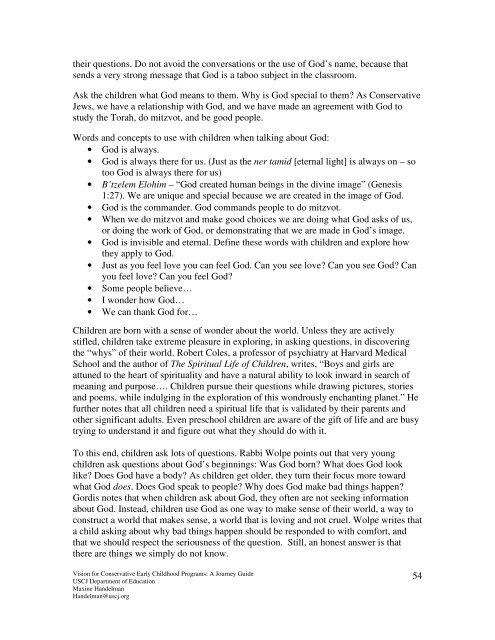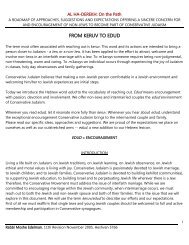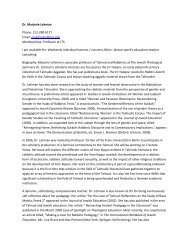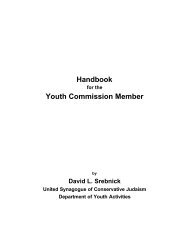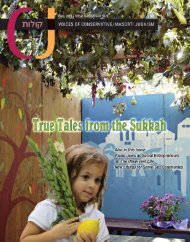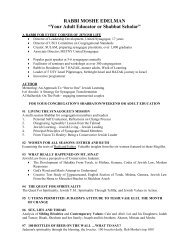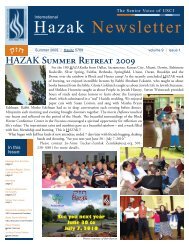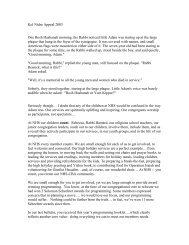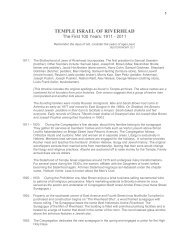Vision for Conservative Early Childhood Programs: A Journey Guide
Vision for Conservative Early Childhood Programs: A Journey Guide
Vision for Conservative Early Childhood Programs: A Journey Guide
You also want an ePaper? Increase the reach of your titles
YUMPU automatically turns print PDFs into web optimized ePapers that Google loves.
their questions. Do not avoid the conversations or the use of God’s name, because that<br />
sends a very strong message that God is a taboo subject in the classroom.<br />
Ask the children what God means to them. Why is God special to them? As <strong>Conservative</strong><br />
Jews, we have a relationship with God, and we have made an agreement with God to<br />
study the Torah, do mitzvot, and be good people.<br />
Words and concepts to use with children when talking about God:<br />
• God is always.<br />
• God is always there <strong>for</strong> us. (Just as the ner tamid [eternal light] is always on – so<br />
too God is always there <strong>for</strong> us)<br />
• B’tzelem Elohim – “God created human beings in the divine image” (Genesis<br />
1:27). We are unique and special because we are created in the image of God.<br />
• God is the commander. God commands people to do mitzvot.<br />
• When we do mitzvot and make good choices we are doing what God asks of us,<br />
or doing the work of God, or demonstrating that we are made in God’s image.<br />
• God is invisible and eternal. Define these words with children and explore how<br />
they apply to God.<br />
• Just as you feel love you can feel God. Can you see love? Can you see God? Can<br />
you feel love? Can you feel God?<br />
• Some people believe…<br />
• I wonder how God…<br />
• We can thank God <strong>for</strong>…<br />
Children are born with a sense of wonder about the world. Unless they are actively<br />
stifled, children take extreme pleasure in exploring, in asking questions, in discovering<br />
the “whys” of their world. Robert Coles, a professor of psychiatry at Harvard Medical<br />
School and the author of The Spiritual Life of Children, writes, “Boys and girls are<br />
attuned to the heart of spirituality and have a natural ability to look inward in search of<br />
meaning and purpose…. Children pursue their questions while drawing pictures, stories<br />
and poems, while indulging in the exploration of this wondrously enchanting planet.” He<br />
further notes that all children need a spiritual life that is validated by their parents and<br />
other significant adults. Even preschool children are aware of the gift of life and are busy<br />
trying to understand it and figure out what they should do with it.<br />
To this end, children ask lots of questions. Rabbi Wolpe points out that very young<br />
children ask questions about God’s beginnings: Was God born? What does God look<br />
like? Does God have a body? As children get older, they turn their focus more toward<br />
what God does. Does God speak to people? Why does God make bad things happen?<br />
Gordis notes that when children ask about God, they often are not seeking in<strong>for</strong>mation<br />
about God. Instead, children use God as one way to make sense of their world, a way to<br />
construct a world that makes sense, a world that is loving and not cruel. Wolpe writes that<br />
a child asking about why bad things happen should be responded to with com<strong>for</strong>t, and<br />
that we should respect the seriousness of the question. Still, an honest answer is that<br />
there are things we simply do not know.<br />
<strong>Vision</strong> <strong>for</strong> <strong>Conservative</strong> <strong>Early</strong> <strong>Childhood</strong> <strong>Programs</strong>: A <strong>Journey</strong> <strong>Guide</strong><br />
USCJ Department of Education<br />
Maxine Handelman<br />
Handelman@uscj.org<br />
54


